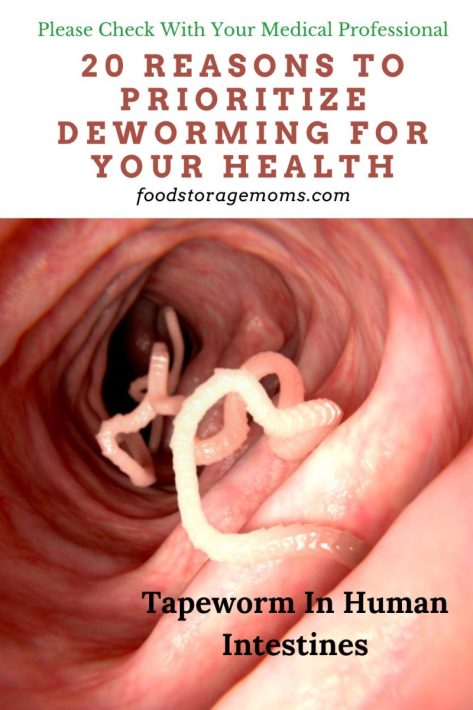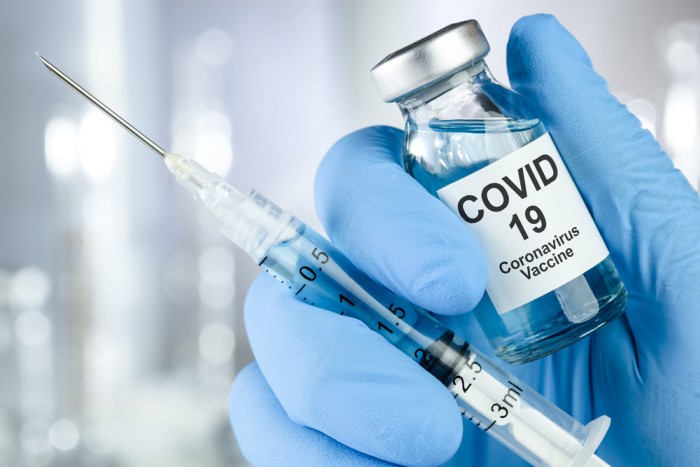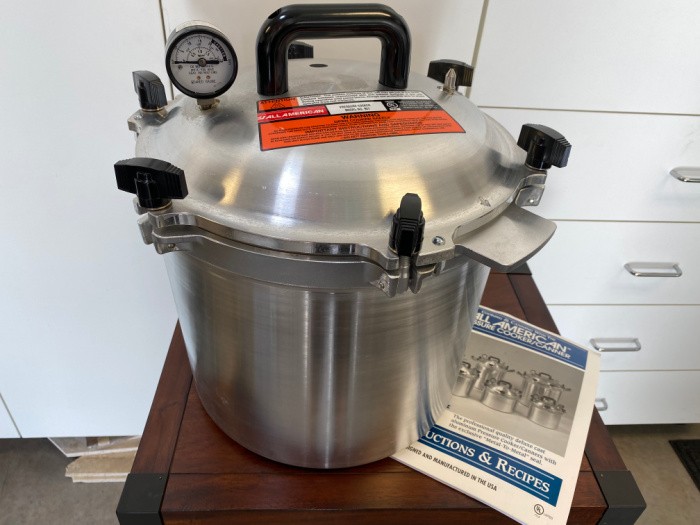20 Reasons to Prioritize Deworming for Your Health
Deworming, a simple yet often overlooked aspect of personal health, plays a crucial role in maintaining overall well-being, particularly in certain locations. Many individuals underestimate the potential risks associated with intestinal parasites and other parasitic infections, assuming they are rare or only prevalent in certain regions. However, the truth is that parasitic infestations can occur anywhere, and their consequences can be severe. I’ve been super interested in deworming and here are 20 reasons to prioritize deworming for your health.

This is something you will need to discuss with your medical professional. Some areas of the country or world are more prone to parasites than other areas. I am not a nurse, doctor, or anyone affiliated with the medical field, but I try to stay on top of recent trends relating to health issues. We need to remember that cooking meat to the correct temperature is critical to staying healthy, especially relating to pork and chicken. Meat Temperature Magnet and Meat Thermometer (The picture above is a pork tapeworm)
1. Preventive Health Measures
Deworming is a preventive health measure that helps protect you from various parasitic and worm infections. Taking proactive interventions to eliminate parasites before they cause harm is a responsible and effective approach to safeguarding your health. 10 Healthy Foods Under $1
2. Global Prevalence
Parasitic infections are not confined to specific geographical locations. Worm prevalence can be found worldwide, affecting both developed and developing countries. Regardless of where you live, the risk of exposure to parasitic worms exists and is a public health issue.
4. Common Infection Sources
Parasites can be contracted through contaminated water, soil, food, or contact with infected individuals. Implementing routine deworming programs helps to counteract potential exposure to these common sources of infection and their long-term effects. The need for consistent sanitation efforts can’t be over-emphasized. Influenza: 9 Early Symptoms of The Flu
5. Asymptomatic Infections
Many parasitic infections can remain asymptomatic for extended periods, making it difficult to detect the presence of parasites in the early stages. Regular deworming through the use of deworming drugs helps to address potential infestations before symptoms manifest.
Some locations have in place mass deworming programs with the use of mass drug administration seldom seen in the U.S. Of course, the doses for various age groups have to be carefully implemented and monitored. Many times, school-based deworming is the norm since they have the ability for tighter controls. Working with schools, the youth can experience better attendance with lower absenteeism, and improved school performance due to higher cognition of lessons taught. With more students in class test scores go up and improved school participation overall is achieved.
6. Nutrient Absorption Enhancement
Parasites can interfere with the absorption of essential nutrients in the digestive tract, leading to malnutrition and related health issues. Deworming ensures optimal nutrient absorption, supporting overall health and well-being from a needed nutrition standpoint.
7. Improved Digestive Health
Parasitic infections can disrupt the normal functioning of the digestive system, causing discomfort, bloating, and irregular bowel movements. Deworming to control intestinal worms helps restore digestive health by eliminating these unwanted invaders. Emergency Prepping with Oak Trees
8. Enhanced Immune Function
Chronic parasitic infections can suppress the immune system, making the body more susceptible to other infections and diseases. Modern medicines and regular deworming support immune function, contributing to a stronger defense against various health threats. Better testing has provided improved evaluation of individuals and groups, at least in the short term view. How to Boost Your Immune System
9. Weight Management
Some parasites can contribute to unexplained weight loss or gain. Deworming aids in weight management by addressing the underlying causes associated with parasitic infestations.
10. Improved Energy Levels
Parasitic infections can drain your energy by sapping vital nutrients and causing fatigue. Deworming helps restore energy levels by eliminating parasites and optimizing nutrient absorption. Issues like iron deficiency anemia have been shown to go down with a consistent deworming regimen.
11. Prevention of Complications
Untreated parasitic infections can lead to severe complications, including organ damage and systemic health issues. Deworming is a proactive measure to prevent these potential complications.
12. Children’s Health
Children are particularly vulnerable to parasitic infections, which can hinder their growth and development. Regular deworming is essential for ensuring the health and well-being of children. The Importance of Air Filters for a Healthier Living Environment
13. Pregnancy and Maternal Health
Parasitic infections during pregnancy can pose risks to both the mother and the developing fetus. Deworming is crucial for maintaining optimal maternal health and reducing the likelihood of complications.
14. Cost-Effective Health Maintenance
Deworming is a cost-effective health maintenance strategy. Preventing parasitic infections through regular deworming is more economical than treating the complications that may arise from untreated infestations.
15. Community Health
Deworming contributes to community health by reducing the overall prevalence of parasitic infections. This collective effort helps create healthier and more resilient communities.
16. Environmental Impact
Contaminated water and soil contribute to the spread of parasites. By prioritizing deworming, individuals play a role in mitigating the environmental impact of parasitic infestations. Purified Water vs. Spring Water: The Differences
17. Zoonotic Transmission Prevention
Some parasites can be transmitted between animals and humans. Deworming is essential for preventing zoonotic transmission and reducing the risk of infections originating from animals.
18. Psychological Well-being
Living with chronic parasitic infections can have psychological effects, leading to stress and anxiety. Deworming not only addresses the physical aspects of health but also contributes to psychological well-being.
19. Travel Precautions
Traveling to different regions exposes individuals to varying risks of parasitic infections. Deworming before and after travel is a prudent precautionary measure to minimize these risks, particularly if you experience foreign travel regularly. 35 Items Every Prepper Should Have When Traveling
20. Animal Companions
Pets can carry parasites that may be transmitted to their owners. Regular deworming of both humans and pets is essential for maintaining a healthy living environment.
21. Holistic Health Approach
Deworming is an integral part of a holistic health approach that emphasizes preventive measures to promote overall well-being. When you spend time prioritizing deworming, individuals adopt a proactive stance toward their health. 20 Healthy Habits for Emergency Preppers
Are There Particular Parasites / Worms I Should Be Aware Of?
A common parasite found worldwide is whipworm, especially in children. It’s an infection of the large intestine from the worm that can be found in contaminated water and dirt. It is found more often in hot humid climates and in regions known for poor personal hygiene and sanitation.
The common symptoms are bloody diarrhea, painful and frequent bowel movements, abdominal pain, nausea, vomiting, headaches, sudden and unexpected weight loss, and the inability to control your bowel movements. You treat the infection with antiparasitic meds like albendazole and mebendazole for one to three days.
Another common infection is from hookworm. This parasite affects the small intestine and the lungs. You start seeing symptoms like itchiness and a rash. Humans generally come in contact with hookworms as they interact with the larvae found in dirt that’s been contaminated by feces.
Symptoms include abdominal pain, colic or cramping in infants, intestinal cramps, nausea, fever, stool with blood, loss of appetite, and an itchy rash. The same medications used for whipworm are used to clear hookworm infections. Be aware that your pets can also get this invention, especially puppies and kittens.
Should I Worry About Worms in My Pets?
A very common worm in dogs is the roundworm. The mother dog can actually pass the worm to her baby pups, if she’s infected. The grown worms live in the dog’s intestines and may show symptoms of diarrhea, vomiting weight loss, very dull hair color, and potbelly. If in the lungs, the dog will develop a cough. These worms can grow to be several inches long.
It’s important to keep your dog’s play area clean, and humans need to be cautious to wash their hands after cleaning up poop or vomit from their dogs. To keep your dog free from infection, your vet can prescribe medication to give your dog every month so they stay healthy.
What Is Ringworm?
Contrary to its name, ringworm isn’t caused by a worm infection. Ringworm is actually a fungal infection on the skin that causes a ring-shaped lesion that looks similar to eczema and psoriasis. It is very common to be found on hairy parts of the body like the scalp and beard. It also is often located in sweaty and moist places like the groin or between the toes.
The symptoms are itchiness, scaly patches on the skin that are red, brown, and gray, and raised skin called plaques. It can also include blisters or pustules. Some people with the infection experience hair loss.
It is a very contagious disease and can be transmitted between humans and animals. It needs to be treated with an antifungal medication prescribed by your health professional.
More Tips
- The Importance of Air Filters for a Healthier Living Environment
- 20 Healthy Habits for Emergency Preppers
- Is Dark Chocolate Healthy For You?
Final Word
Deworming is a fundamental aspect of maintaining good health and preventing the complications associated with parasitic infections. Prioritizing deworming is a small yet impactful step towards a healthier and more resilient future. May God Bless this World, Linda
Copyright Images: Pork Tapeworm Depositphotos_242663702_S By Crevis, Tapeworm in Human Intestines Depositphotos_250922274_S BY Animaxx3d























I had a steer with ringworm last year. We had to rope it and treat it. You’d think they’d appreciate a daily soapy rub down more than this one did. We would have as much of the treatment on us as him by the end of the wrestling match.
I also get a lot of ivermectin on my hands when I treat all the critters from rabbits to cattle. Donkey gets paste but I gotta hand feed it to her so again on my hands.
I should be covered for worms
Hi Matt, great tip on the Ivermectin on your hands, wow! I got the giggles picturing you and the steer with the treatments and the wrestling match. LOL! I never would have thought about using the creamy Ivermectin on my hands, great tip! Good one, Linda